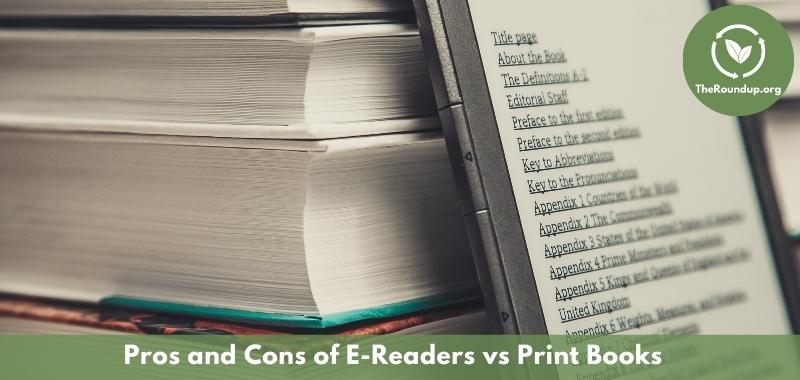
Are you looking for ways to be more eco-friendly? If so, you may have considered switching to eBooks.
An e-reader is a digital device that can store hundreds of books in digital format. They take up less space, use zero paper, and have a far lower shipping overhead.
But are they really any better for the environment than traditional printed books?
Let's take a closer look at the pros and cons of eBooks to see if they're really worth your consideration.
Contents

When deciding whether or not an e-reader can be said to be environmentally friendly, we need to look at the merits of e-readers compared to printed books.
Is reading on an iPad or Kindle more eco-friendly than books, or is it the other way round?
There are several reasons why using e-readers can actually be bad for the environment.
These points mainly refer to a single e-reader, but we should also consider replacements.
I read a lot and I have a Kindle, which so far has lasted for over 10 years.
But several new versions have been released during that time, and many people tend to upgrade to the latest model, just as they do with smartphones. And some devices won't last as long as mine has.
Every time a new e-reader is bought, you have to factor in the environmental impact of its production all over again.
Are hardback and paperback books bad for the environment? In general, it is considered that they are. We all know that paper comes from trees, but the water used in paper production, the ink, shipping, and waste from its disposal all needs to be considered.
E-readers negate several of the main disadvantages of printed books.
How environmentally friendly are print books, and do they have any advantages over an e-reader? In fact, there are a few advantages to consider.
Your overall literary carbon footprint will depend on your reading habits and the number of books you buy new.
It's true that the production of an e-reader creates 22.4x as much co2 as that of a single printed book, and also has an ongoing environmental cost for recharging and the hosting and transmission of new ebooks.
However, it is reasonable to say that after a certain amount of use, the e-reader starts to have a lower overall environmental impact.
It seems obvious that e-readers are going to be the future, due to their convenience and lower cost. Indeed, many US colleges are now making their learning materials available on Kindle to save paper.
Deforestation is a huge environmental issue that is directly linked to greenhouse gas emissions and climate change. So it's no surprise that people are concerned about the environmental impact of the book publishing industries.
The good news is that the print industry is heavily regulated, and in many countries, laws require that paper products be made from recycled materials. In fact, the book industry is one of the largest consumers of recycled paper.
Around 10% of all global deforestation can be attributed to paper book production, which while still significant, is less than several other factors.
No, it's not fair to say that books waste paper. The fact that most books are often made from recycled paper is one point in their favor, and we also need to consider the value of books to our society as a whole. We've used them for centuries to help us learn after all!
Books can also be reused or repurposed in many different ways – for instance, you can donate them to a local library or school, or sell them at a used bookstore.
There is some evidence that suggests that reading from electronic screens (such as those on eReaders) can cause eyestrain and other vision problems.
The glare from electronic screens can also be damaging to your eyes over time.
So if you do choose to read eBooks regularly, make sure to take breaks often and give your eyes a rest.
Yes, books are biodegradable--although the time it takes for a book to degrade depends on the environmental conditions.
In optimal conditions, paperback books will break down and decompose in less than 6 months. However, if conditions are less than ideal (such as in a landfill), it can take a lot longer for a book to decompose.
Hardback books also biodegrade, as the cover is made from cardboard. Find out more about cardboard biodegradation here.
The Asus Zenpad tablet and the Kobo e-reader are currently two of the most environmentally friendly e-reader models on the market.

